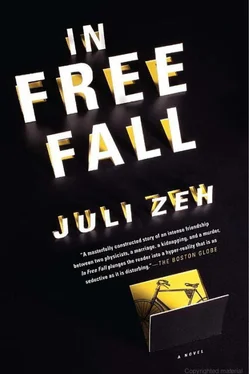Schilf’s guest lectureship at the police college had been anticipated with great interest. He was preceded by his reputation as a veritable prophet of crime. He was said to avoid working in a team and was seldom seen at headquarters, and he solved his cases more or less in his sleep. They expected a magician. When Schilf finally stood before the class, a chill wind of disappointment swept through the room. In his early fifties, he behaved like an old man. Beneath the worn jacket, his shoulders drooped as if he were trying to counteract his height. Colorless strands of hair that had once been blond hung in his face. Standing stooped at the blackboard, he snapped pieces of chalk between his fingers. He kept interrupting his lectures for no apparent reason, swaying from one foot to another and listening with a shocked expression to something within himself, as if hearing the echo of a thunderclap that had happened long ago. When he continued speaking, he spoke in sentences that no one understood. “I have no memory—that is why I can see into the future.” Or, “Two contradictory statements are mostly right and wrong at the same time.”
Or his favorite: “Coincidence is the name given to the greatest human error.”
None of the students took his strange behavior as a disguise (they were right). Rather, they believed, they were faced with the pathetic remains of a man who had once been successful (here they were wrong).
At first Rita had thought of him as a genius damned. After he had turned her from an innocent to a skeptic in one fell swoop during the first lunch break, she called him a damned genius. When he said good-bye to her after his final lesson, he took hold of her hands without ceremony, gave her a piercing glance, and said, “Rita, child, what hefty mitts you have!” She pulled her fingers free and retorted, “And what a wrinkled visage you have!” They looked each other in the eye and laughed. Rita has not seen him since.
Of course, she had liked the half-mad Schilf. And precisely because of this—exactly as she has learned from Schilf himself—she does not trust him. If there is one thing she does not need right now, it is the presence of a genius, especially one who sees through her system of coming to conclusions. Next to him, her diligence and carefulness will count for nothing. Ralph Dabbelink is her most important case to date. His death, which could hold the key to the hospital scandal, belongs to her.
Although it is already remarkably warm at seven in the morning, Rita pulls on a cardigan over her dress before she leaves the house. In her lipstick-red Corsa she drives to Heinrich-von-Stephan-Strasse, holds up her pass to the card reader, and parks under the moss-covered, corrugated iron roof. Ignoring the back door, she walks around the building to enter it—with shoulders thrown back and chin jutting forward—through the brick front entrance as she does every day.
AT RECEPTION, A MAN IS STANDING with both hands on the counter, his forehead against the Plexiglas, as if he cannot keep himself upright any longer. Rita knows these blokes, and finds them repulsive. This one is tall and well built, someone who could easily have made something of himself. His hair is greasy, a dull street-dog yellow. His clothes must have cost a fortune; now they are smeared with blood and crumpled from head to toe. The man has clearly spent several days in them. Regardless of whether such people hand themselves over or are brought in, they cause the kind of trouble that never ends well.
Rita instinctively holds her breath to escape any whiff of alcohol fumes. The stranger does not even turn at the sound of her slapping sandals as she passes by. He stares ahead sightlessly. The duty officer raises his hand in greeting as he continues speaking into his telephone. Almost every morning, Rita climbs the stairs feeling relieved that she no longer has to deal with a certain type of everyday business.
She reaches her office on the third floor, a little breathless, takes off her cardigan, and falls into the black leather chair. Behind the frosted glass of her desk, she still feels like a child who is shuffling around the house in her father’s shoes for fun. She doesn’t mind. She knows very well that she has an office to herself at her current grade only because none of her colleagues wants to share one with her. She loves this room, especially the under-floor computer cable that pops out through a hole in the carpet by a leg of her desk. Along with the rows of impeccably labeled folders on the shelves, it projects an atmosphere of professionalism in which Rita revels every morning, as if bathing in dragon’s blood before setting forth to do battle.
A fan of letters to be dealt with is spread out next to the keyboard. The window was open through the night and has let in cool air, which will last for a while between the thick walls of the building. Far beneath, the usual pack of sparrows twitters in the hedges that a former graveyard gardener tends with great care. Rita looks smugly across the parking lot at the treetops. They are so far away that feathered parasites cannot look in on her. If her office were on the ground floor, Rita Skura would bring her cat to work.
She looks through Dabbelink’s files for a bit. The photos have the most impact, and having seen them for a hundred times does not diminish their power to shock. Dabbelink’s head, wedged in the fork of a tree. The same head again, lying on a stretcher next to the twisted body to which it had belonged only a short while before. There is a length of spinal column sticking out of the body, white and clean. The loose ends of the carotid artery, trachea, and esophagus look like the tubes hanging out of a broken machine. The report by the forensic expert stated that the victim had noticed the trap at the final second, and lifted his head in shock—otherwise the cable would have split his skull. In retrospect, Rita is grateful to Dabbelink for this noble gesture. His condition is already problematic enough.
One of the documents that has just arrived is a report from the forensic laboratory. Delighted, the detective claps her hands like a little girl when she reads the results. Only under protest did the men securing the crime scene carefully transport two square meters of the forest floor, agitated ants and all, to the laboratory. Now they have the genetic profile of a man, who has not yet appeared in any database, but who will shortly be found. Found by her. Apart from this, an indignant Freiburg woman has filed charges against the as-yet-unknown person because she found a pile of garbage in her compost bin on the morning after the murder. With that, Rita has almost everything she needs: the murder instrument and the murderer’s shoes, trousers, and shirt. Everything except the murderer himself, whose continued absence is almost beginning to take on a physical form. The hairs that were found pronounce him blond, and his footprints indicate that he is 1.9 meters tall and weighs 85 kilos. Definitely a handsome and clever murderer, not one of the poor devils that one puts behind bars with regret.
Rita will spend the morning in the hospital and will continue looking out for a man who matches the description. In the cardiology department, there is a rumor going around that someone had been threatening Dabbelink. But no one will say who or how. In a combustible situation like this, practically everyone could have had an interest in Dabbelink’s death: a pharmaceutical company with a priceless reputation to protect; a nurse who fears losing her job; Medical Director Schlüter, afraid that someone knows too much. Rita will grab hold of Schlüter once again before he can barricade himself in the operating theater. Ever since the university has started looking into disciplinary proceedings, Schlüter has been well-nigh invisible in his department. The criminal charges triggered by the hospital scandal were made anonymously. Schlüter claims that a rival heart specialist is trying to blacken his name.
Читать дальше












